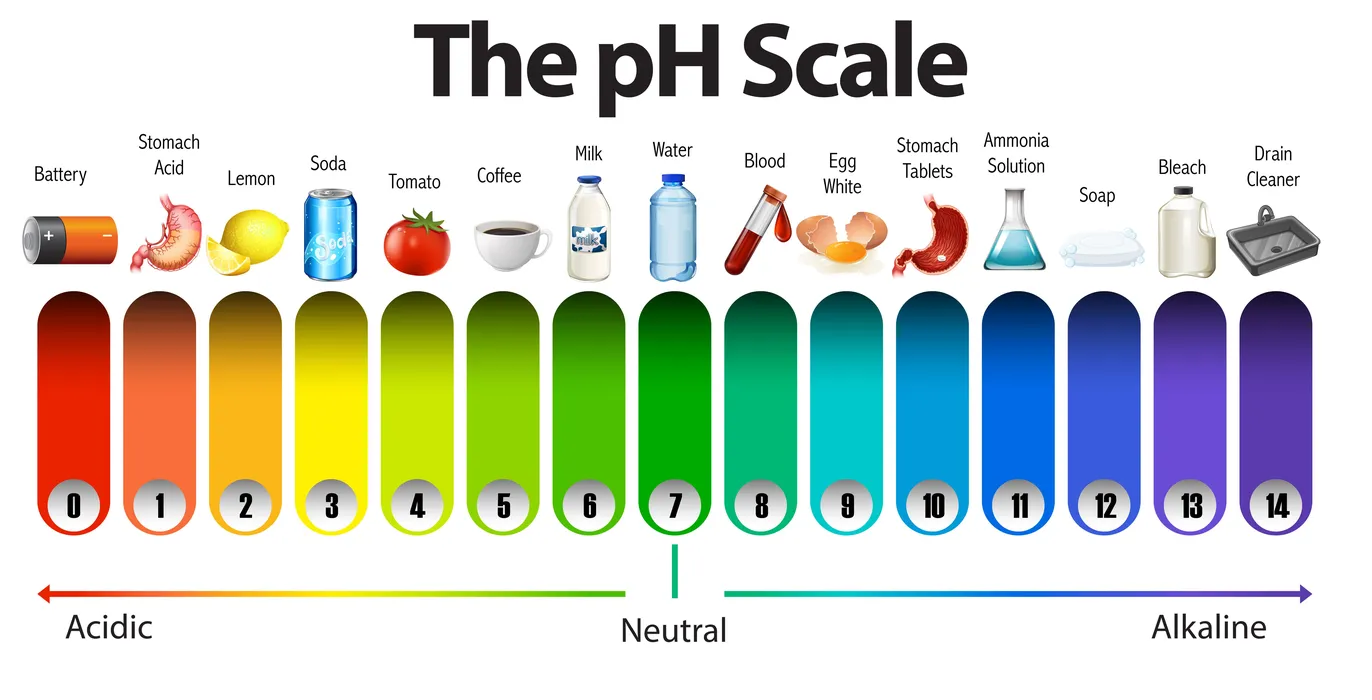Introduction
The most important class of compounds in chemistry are acids and bases. Acids and bases are essential to practically every natural system, including human survival and the functioning of rocks and oceans. You must have come across acid and bases when you tasted lemon or washed your hands with soaps. Acids are sour and can be dangerously corrosive; bases are slippery and can be corrosive as well. In science, compounds are typically categorized as bases, acids, or neutral. The pH scale is used to determine how strong an acid or base is.
Acids
1. Acids release hydrogen ions or a proton when combined with water.
2. They exhibit a pH below 7 and turn blue litmus red.

3. Arrhenius state that “those substances which give hydrogen ions \({H^ + }\) in aqueous solution” are known acids.
\[HA{\rm{ }} + {\rm{ }}{H_2}O{\rm{ }} \to {\rm{ }}{A^ – } + {\rm{ }}{H_3}{O^ + }\]
4. The common acids which we can use in the laboratory are—Hydrochloric acid (HCl), Nitric acid (\(HN{O_3}\)) and Sulphuric acid (\({H_2}S{O_4}\)).
Uses of Acids
| Acid | Uses |
| Sulphuric Acid, H2SO4 | Used as solvent |
| Formic Acids, HCOOH | Used for tanning and dyeing |
| Hydrochloric Acid, HCl | Used as Cleaner |
| Benzoic Acid, C6H5COOH | Used as food preservatives and in dyeing |
| Nitric Acid, HNO3 | Used in Fertilizer, dyes, and plastics |
Bases
1. Bases are substances that release hydroxyl ions when combined with water to form an aqueous solution.
2. They exhibit a pH level above 7 and turn red litmus to blue.
3. A base has a basic group that separates in an aqueous media or a dissociable hydroxyl group (Arrhenius base).
4. Metal hydroxides are mostly basic and rapidly produce hydroxyl ions in an aqueous solution. The majority of basic hydroxides are formed by alkali metals and a few alkaline earth metals.
\[BOH\left( {aq} \right){\rm{ }} \to {\rm{ }}{B^ + }\left( {aq} \right){\rm{ }} + {\rm{ }}O{H^ – }\left( {aq} \right)\;\]
5. Sodium hydroxide, potassium hydroxide, and ammonium hydroxide are some examples of bases.
Uses of Bases
| Bases | Uses |
| Potassium Hydroxide, KOH | Soaps and Batteries |
| Ammonia NH3 | Fertilizer |
| Calcium Hydroxide, Ca(OH)2 | Mortar and Plaster |
| Magnesium Hydroxide, Mg(OH)2 | Detergent |
| Sodium Carbonate Na2CO3 | Detergent |
Properties of Acids and Bases
| Properties | Acid | Base |
| Taste | Sour | Bitter |
| pH value | less than 7 | greater than 7 |
| Electric conductivity | Good conductor | Good conductor |
| Test with litmus paper | Turn red litmus to blue. | Turns blue litmus to red. |
| Touch | – | Slippery |
The similarity between an acid and a base
1. They both react with litmus.
2. They both are compounds
3. Likewise, they both release ions in their solution
4. Forms salt and water when combined. For example, when Ammonium hydroxide reacts with Hydrochloric acid, it gives Ammonium Chloride.
\[N{H_4}OH{\rm{ }}\left( {aq} \right)\;{\rm{ }} + {\rm{ }}HCl\left( {aq} \right)\;\, \to {\rm{ }}N{H_4}Cl{\rm{ }}\left( s \right){\rm{ }} + {H_2}O{\rm{ }}\left( l \right)\]
Summary
Acidic substances are usually identified by their sour taste. An acid is a molecule which can donate an \({H^ + }\) ion and can remain energetically favourable after a loss of \({H^ + }\). Acids are known to turn blue litmus red.
Bases, on the other hand, are characterized by a bitter taste and a slippery texture. A base that can be dissolved in water is referred to as an alkali. When these substances chemically react with acids, they yield salts. Bases are known to turn red litmus blue.
Frequently Asked Questions
1. Which acid or base, when dissolved in water, releases hydroxyl ions?
Ans. Bases are chemicals that dissolve in water to produce hydroxyl ions, or \(O{H^ – }\), and are also referred to as alkalis.
2. What kind of salt is produced when a strong acid reacts with a weak base?
Ans. The salts are known as acidic salts because they are formed when strong acids and weak bases react. Every salt has a pH that is under 7. Similar to this, many salts’ aqueous solutions have a pH of 7 and are naturally neutral.
3. Which has a sour taste between acid and base?
Ans. Bases have a bitter taste, while acids have a sour taste. Acid always has a pH value lower than 7, which causes it to turn blue litmus paper red.
 Mission Statement
Mission Statement
“Empower every student to achieve full potential”
88Guru has been established with the social objective of making quality video-based learning material available to all Indian students. Technology, Connectivity and Social Media are rapidly changing the world of Education and we wish to lead the transformation of the tuition industry in India.
88Guru is the perfect complement to the current tuition model. 88Guru creates a wonderful opportunity for children and parents to bond while engaging in a valuable learning activity. It also provides the complete curriculum at your fingertips for those moments when you need some help at short notice. We believe that this mode of tuition could be transformational, adding hours to a child's day while providing complete control over the learning process.
Every course is taught by the best teachers from India's top schools and conducted in an engaging manner to keep students involved. The e-learning process consists of video-based instructions, computer-graded assignments, and a dashboard which allows the student and parent to track progress.



